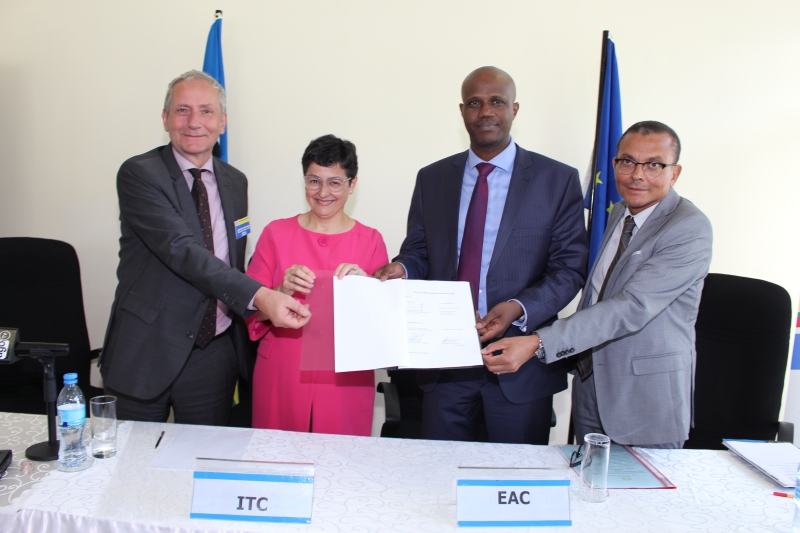
MARKUP Initiative to boost market access to Europe for East African SMEs
(Arusha, Tanzania) – Agribusinesses in East African Community (EAC) countries are to benefit from greater business opportunities in both East African and European markets thanks to a new initiative funded by the European Union. Unveiled today in Arusha, Tanzania, the Market Access Upgrade Programme (MARKUP) will provide support to small and medium-sized enterprises (SMEs) across the region to improve access to EU markets and increase interregional trade.
MARKUP sets out to support East African SMEs specialized in a variety of sectors, including avocado, cocoa, coffee, horticulture, spices and tea. Interventions will focus on the identification and elimination of barriers to trade; improving competitiveness; strengthening of value addition for selected priority sectors; ensuring compliance with international regulations; provide access to trade finance ventures; and supporting the identification of opportunities for trade and foreign direct investments.
The Euro 35 million mARKUP initiative is funded by the EU as part of the 11th European Development Fund. The programme will be implemented over a four year period under the overall supoervision of the EAC Secretariat. Two of the most important technical implementation partners are the International Trade Centre (ITC) and Deutsche Gesellschaft für Internationale Zusammenarbeit (GIZ).
Announcing the launch of MARKUP, Mr Jose Correia Nunes, Head of Cooperation at the EU Delegation in Tanzania said: ‘This programme supports EAC efforts to improve the regional trade enabling environment as well as enterprise export competitiveness for a number of products with high growth potential, implying existing supply gaps particularly in Europe, a sufficiently high degree of readiness and sector organisation in order to meet strict quality and quantity requirements and the possibility to tap into higher – than now – price segments.’
ITC Executive Director Arancha González said: ‘MARKUP aligns very closely with the regional integration priorities of the East African Community. It aims to build the competitiveness of MSMEs across the region, and support them to increase production, take advantage of market-access opportunities and create more value addition. There is a growing demand in the EU for the products produced in the EAC. MARKUP will capitalize on this and help create sustainable market linkages between Europe and the EAC, and further contribute to job creation and inclusive development in the region.’
"The MARKUP project complements the longstanding support of the German Government to the East African integration process. In times where interregional free trade is questioned and voices of protectionism can be heard louder than before, we are especially proud that the European Union has entrusted us with this initiative. We will work closely with the EAC Secretariat and the member Partner States to support the implementation of the Customs Union and the Common Market Protocol in order to improve the preconditions for trade and value addition in the region," GIZ said GIZ Country Director, Ernst Hustaedt.
Speaking at the function, EAC Secretary General Amb. Liberat Mfumukeko said that the main objective of MARKUP is to help the EAC in unlocking challenges in accessing the European Union markets in addition to enhancing intra-EAC trade.
“In addition, MARKUP will also enhance the capacity of the EAC to participate and take full advantage of the other free trade arrangements that are being concluded like the Tripartite COMESA-EAC-SADC Free Trade Area and the Africa Continental Free Trade Area,” said Amb. Mfumukeko.
The Secretary General noted that the major challenge that had inhibited EAC exports to the EU and other international markets was the failure by EAC products to meet the high product standards in these markets.
“There are priority commodities that have been selected by the EAC Partner States which include cocoa, coffee, tea, and horticulture products that have a lot of potential for mass production in all the EAC Partner States,” said Amb. Mfumukeko.
Taking advantage of a growing global demand for avocado, cocoa, coffee, spices, tea and horticulture products, selected SMEs will be trained to adapt their agribusinesses to better take advantage of opportunities in regional and global value chains.
Crucial to the success of MARKUP will be the successful inclusion of women and youth in trade. In most East African countries, women and youth account for a large proportion of the labour force but are often prevented
Central to MARKUP, too, will be improving the compliance of SMEs with international quality and standards requirements. Improving awareness and transparency related to sanitary and phytosanitary measures, as well as on technical barriers to trade, will enable participating SMEs to gain product certification that will ease their efforts to enter foreign markets.
-ENDS-
For more information, please contact:
Mr Owora Richard Othieno
Head, Corporate Communications and Public Affairs Department
EAC Secretariat
Arusha, Tanzania
Tel: +255 784 835021
Email: OOthieno [at] eachq.org
About the East African Community Secretariat:
The East African Community (EAC) is a regional intergovernmental organisation of five Partner States, comprising Burundi, Kenya, Rwanda, Tanzania and Uganda, with its headquarters in Arusha, Tanzania.
The EAC Secretariat is ISO 9001:2008 Certified
